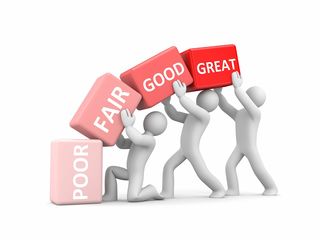Career
People Prefer to Be Evaluated Relative to Themselves
People feel feedback is more fair when you look at performance changes.
Posted April 23, 2018

Evaluation plays a central role in school and work. Grades, promotions, raises, and awards are all determined by giving people some sense of their level of performance.
In order to evaluate people, there are three kinds of comparisons that can be made. You can compare people to each other, you can compare a person’s current performance to their own performance in the past, or you can compare people’s performance to some fixed benchmark.
In school, the benchmark is sometimes used. School boards will lay out a set of learning objectives and then use tests to determine whether students have successfully completed those objectives.
In the workplace, though, it is hard to lay out objective benchmarks for performance. The tasks people have to perform at work are too varied for there to be a clear set of standards that people should achieve. Instead, employees are typically evaluated either by comparing the performance of different people or by comparing a person’s current performance to his or her past performance.
Which of these do people prefer?
This question was explored by Jinseok Chun, Joel Brockner, and David De Cremer in a 2018 paper in Organizational Behavior and Human Decision Processes.
First, the authors collected survey data from employees of a variety of companies. Employees were asked about the degree to which their work evaluations were based on comparisons between people or based on comparing prior performance to current performance. Then, they were asked about whether people felt that the evaluations were fair in two ways. One type of fairness was procedural fairness—is the procedure being used to make the evaluation a fair one. The other type of fairness was interpersonal fairness—is the procedure one that makes people feel they are being treated with dignity and respect.
In this study, the more that people felt that they were evaluated by comparing their past performance to their current performance, the more that they felt that their evaluation was fair both procedurally and interpersonally. In contrast, the degree to which people felt they were evaluated by comparing their performance to others was not related to either type of fairness.
In one of the other studies in this paper, participants were told that they and another participant were going to perform a task, after which an evaluator was going to tell them how they did. The participants performed two rounds of judgments about other people. In each round, they rated characteristics of five people.
After completing the second round, participants were given feedback on their performance and either told that the feedback was based on how they did in round 2 of the judgments compared to their performance on round 1 or they were told that the feedback compared their performance to that of the other participant in each round. The feedback they received was either positive or negative. Participants judged the procedural and interpersonal fairness of the feedback. They also judged whether they felt the feedback took into account their individual characteristics.
As in the earlier study, participants thought that the feedback was fairer both procedurally and interpersonally when the feedback compared their performance in round 2 to that of round 1 rather than comparing their performance to the other participant. This was true both for positive feedback and negative feedback (though participants generally felt that negative feedback was less fair than positive feedback). Participants also felt that feedback comparing their later performance to their earlier performance was more individualized than feedback that compared them to someone else. Statistical analyses suggest that the difference in the feeling that the feedback was individualized explained the differences in fairness between the types of feedback.
All of this suggests that when evaluating the performance of other people, there is a good reason to focus on looking at changes in performance of people over time. When you compare one person to another, there are often many things that leap to mind as differences between people that might explain the difference in performance. Another person might have more experience, or easier clients to handle, or fewer constraints on their personal life that affected their work. Those factors decrease the sense that the evaluation was fair. But, when you look at performance changes, then at least the person being judged feels like there are fewer extraneous factors that would explain differences in performance over time.
References
Chun, J., Brockner, J., De Cremer, D. (2018). How temporal and social comparisons in performance evaluation affect fairness perception. 145, 1-15.


